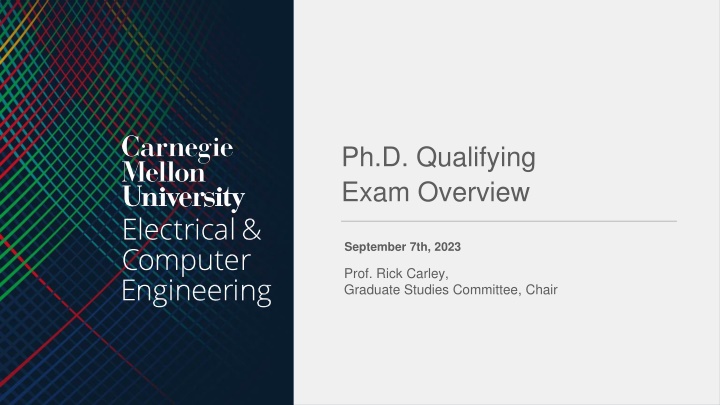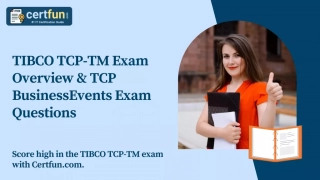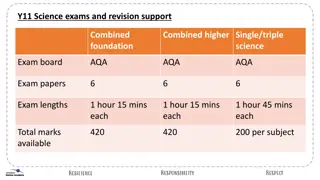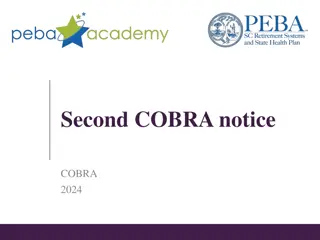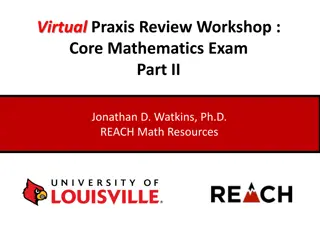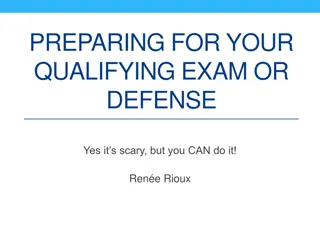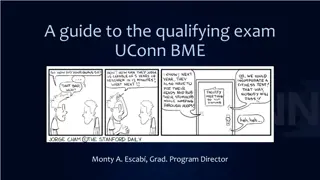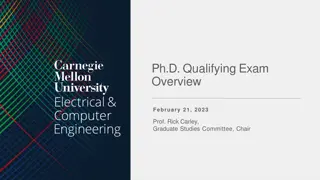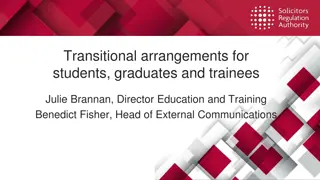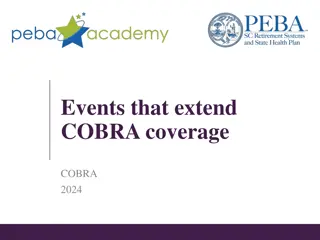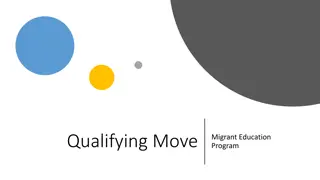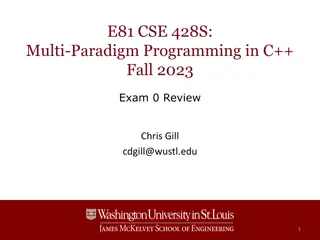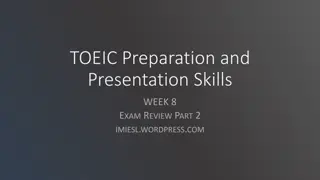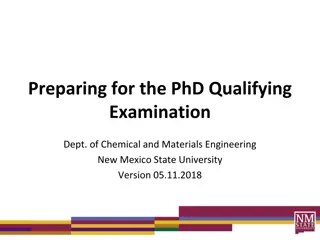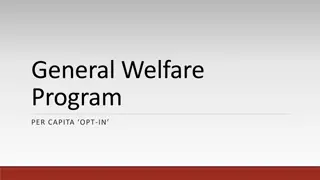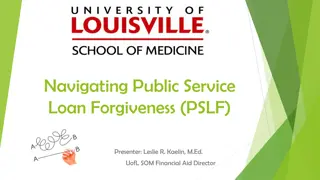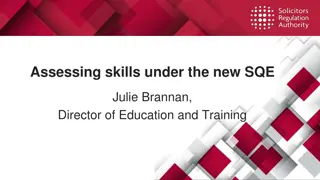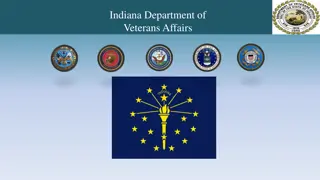Ph.D. Qualifying Exam Overview
The Ph.D. Qualifying Exam Overview provides key details for students preparing for the exam, including the philosophy, components, important dates, and exam expectations. It emphasizes student control over exam aspects, the required preparations, and the focus on technical understanding and communication skills. The exam is centered on selected technical papers and the student's research work, assessing depth and breadth of knowledge. Clear distinctions are made about what the exam entails and what it does not cover.
Download Presentation

Please find below an Image/Link to download the presentation.
The content on the website is provided AS IS for your information and personal use only. It may not be sold, licensed, or shared on other websites without obtaining consent from the author.If you encounter any issues during the download, it is possible that the publisher has removed the file from their server.
You are allowed to download the files provided on this website for personal or commercial use, subject to the condition that they are used lawfully. All files are the property of their respective owners.
The content on the website is provided AS IS for your information and personal use only. It may not be sold, licensed, or shared on other websites without obtaining consent from the author.
E N D
Presentation Transcript
Ph.D. Qualifying Exam Overview September 7th, 2023 Prof. Rick Carley, Graduate Studies Committee, Chair
Agenda 1. Review Ph.D. qualifying exam philosophy and components 2. Review important dates and deadlines 3. Q&A session
Before we begin This presentation serves as an overview of the Qual Exam Process To best prepare for exam, you must: Watch the Fall 2023 recording and presentation slides available on the ECE Qual Exam webpage. Reference Canvas Qual Exam course for deadlines, reminders, announcements, etc. 3
3 Big Takeaways 1. You have control over many aspects of the qual exam experience, including the topic, background papers to be discussed, and (to some degree) the committee. 2. Fall 2023 exams will be in-person, on campus for students. Under specific circumstances, faculty are allowed to attend qual exams remotely. Plan accordingly: arrange a laptop/desktop, tablet and stylus, headphones, etc. 3. Communication from Academic Affairs office sent via Canvas Qual Exam course 4
2nd year Ph.D. students should be able to: Read and understand three [3] technical papers Review these papers briefly, explain how they inform your research work Talk for 30 minutes about your own work, even if it is very early or preliminary Answer detailed questions about: Your work The 3 selected Technical papers Obvious undergraduate-level technical background for this material 6
What the exam IS In a word, focused by you. You provide the technical scope for the exam. We test you on your understanding within that scope. Exam based on material in your talk, on the 3 Technical papers you selected and on the engineering underpinning of that material. Exam stresses your ability to understand and communicate technical linkages to the topics you have chosen. This requires some breadth and some depth. It is a skill we expect all PhD students to master. 7
What the exam IS NOT A comprehensive exam for all work on the leading edge of this particular field An open-ended exam for anything the faculty feel you ought to know A thesis proposal exam 8
Dates & Deadlines
Important dates and deadlines October 6: Declaration application deadline Online application with faculty selections 1-page abstract 3 technical background papers October 27: Review paper submission deadline November 3: Exam committees announced to students November 6-16: Oral presentation with faculty committee November 20: Official results with feedback released 10 https://www.ece.cmu.edu/academics/phd-ece/qualifying-exam.html
Declaration Application, due OCT 6 Materials: 1. One-page abstract 2. Three [3] background papers of your choice 3. Online application submitted via Qual Declaration app portal Includes preferred faculty list, RANKED in order (top to bottom) NOTE: You may submit your declaration application once. 12
Abstract (due 10/6) Requirements: 1-page abstract as part of your qual exam declaration package: Your name Title of qualifying exam talk 1-2 paragraph description of your planned talk 13
Background papers (due 10/6) Requirements: Three [3] technical background papers uploaded with application No more than 2 papers may have authors currently at CMU Only 1 paper can have you (the student) as an author Total length, counting all 3 papers, should not exceed 50 pages NOTE: Submissions exceeding 50 pages will be rejected. 14
Background papers (due 10/6) Papers that provide context to GSC and exam committee about your work What is your work about? Why does it matter? Where did it come from? Why are you doing it like this? Broad latitude on acceptable papers : conference, journal, book chapter, thesis chapter, your own papers, technical reports 15 https://www.ece.cmu.edu/academics/phd-ece/qualifying-exam.html
Background papers (due 10/6) You should consult with your advisor(s) for paper recommendations. Papers should provide a good foundation and explanation for the work you will describe in your paper and your talk Consider 1 basic paper that is a tutorial or survey about the critical ideas in the area, then 2 papers that relate more specifically to your own work 1 paper should have been published within the last 5 years so that faculty can see one example of recent work in the area 16 https://www.ece.cmu.edu/academics/phd-ece/qualifying-exam.html
Application: Faculty selections (due 10/6) Recommended process: 1. Go to Qual Exam Declaration app to review list of available faculty 2. Consult your advisor(s) for guidance to select and rank preferred faculty for your committee 3. Return to Qual Exam Declaration app to select AND rank faculty, top (most preferred) to bottom NOTE: Qual app includes tools to add, remove, and order faculty list. 17
ECE Qual Exam Fall 2023 Canvas Course After submitting the Qual Exam Declaration Application, you will be added to the ECE Qual Exam Fall 2023 Canvas Course. The Canvas Course will help you to prepare for the Ph.D. qualifying exam.
Review paper, due October 27 Focus and Purpose: This paper defines the focus of your Qualifying Examination topic. You should explain your technical area, your work and the relationship between your work to the background provided in the three background papers. 20
Review paper (due 10/27) Requirements: 4-page, 2-column conference format Firm requirement; do not exceed 4 pages! Keep it short; make it professional Clear goals: Explain your own technical area Explain your own work Explain relevance of the three papers to your technical area NOTE: You may submit your review paper once. 21
Suggested Review paper format (due 10/27) Pages 3 & 4 Pages 1 & 2 - Introduce the area - Introduce your own work - Summarize your own problem, goals - Summarize the problem(s) - Explain the history - Explain what prior ideas you use. - Summarize key ideas and contributions of your 3 technical background papers - Summarize what you have done: Key technical decisions, results. What worked, what didn t, why. - Conclusions 22
Qual Exam committee Requirements: Select 7-10 preferred or most relevant faculty members for your committee from list in your declaration application Strongly recommended to select 10 faculty for your application. Advisor receives link to formally approve declaration, but should be discussed beforehand GSC selects 3-person exam committee based on student declaration application, advisor input, and faculty availability 26
Known faculty unavailable for Fall 2023 quals Courtesy Faculty ( Other ) ECE Home Faculty Franz Franchetti Farnam Jahanian Raj Reddy Phil Koopman Akshitha Sriraman Gauri Joshi Vanessa Chen Brandon Lucia Virgil Gligor Pulkit Grover Larry Pileggi Bill Sanders NOTE: Updates to be added to Canvas course with accompanying announcement. 27
Exam modes 1. Student and 1-3 faculty committee members on-campus; perhaps some committee members participate remotely via Zoom. 1. Only in rare cases - Student on-campus with all committee members participating remotely via Zoom. 3. Fully virtual with student and faculty committee participating from off-campus locations. Contingency plan ONLY for campus posture change or health reasons (e.g., self-quarantining, medical accommodation) 29
Exam modes, contd Default mode: Student conducts exam on-campus in conference room Prepare to conduct exam with at least 1 faculty member participating remotely. Virtual qual exams has increased scheduling flexibility with faculty to serve on exam committees, thereby increasing the odds of most- preferred faculty on application included on committee Over 4 semesters of virtual quals, technology has not been cited as a major factor in exam outcome 30
Needed technology Critical: A touchscreen device and functional stylus is required for the exam. Any device/stylus combination will do. An iPad/Pencil combination works well with Zoom s native Apple screen share feature. Talk with your advisor if you need to purchase or borrow technology. Recommended setup: laptop for camera and presentation, plus tablet for whiteboarding 31
Qual resources Qual declaration application portal ECE qual exam webpage, includes important dates/deadlines EGO qual webpage, includes mentoring sessions, practice talk signup, templates, etc. 32
Exam format Oral presentation: 30 minutes You talk first, about your work, from prepared slides Committee questions: 90 minutes Questions from your 3 faculty members, about your area, the technical background papers, your review paper, basic background 35
Committee: composition 3 faculty chosen by GSC that understand (roughly) your area Committee reads 3 background papers and review paper in advance of exam NOTE: Exam is not about general breadth it s all about this area and these papers 36
Timeline policy Must attempt exam by 4th academic semester, though possible to attempt earlier Must pass exam by 5th academic semester Failure after second attempt will require student to exit Ph.D. program or transition to the MS program Recent pass rates (Fall 2018-Fall 2020): Total exams, n=62 81% first attempt; 100% by second attempt (some retakes due F21) 37
Evaluation criteria on faculty grading sheet Demonstrates Oral Communications Skills (e.g. comfortable having student present at a conference in an understandable way?) Demonstrates Written Communication Skills (communicates problem, approach and results in writing?) Demonstrates Ability to Interpret Results (either their own or others) 38
Evaluation criteria on faculty grading sheet, contd Demonstrates Breadth of Knowledge (understands the bigger picture and concepts related to his/her work?) Demonstrates Depth of Knowledge (has deep understanding of concepts and details in his/her area?) Demonstrates Critical Thinking and Problem-Solving Skills (applies principles and knowledge to probe deeper, understands trade-offs/fallacies/insights? finds solutions applying scientific or engineering skills?) 39
Evaluation and decision meeting Qual outcomes are not decided until all faculty convene to discuss performances Scores and feedback from qual exam committee considered Advisor is permitted to give appropriate feedback at the faculty meeting Final decision by vote of faculty & students notified shortly thereafter by advisor (unofficially) and by the Academic Affairs office (officially) 40
Tips about declaration application Submit declaration application ASAP after consulting faculty advisor. Do not need to wait until declaration deadline to submit. Submit as soon as you re ready and begin working on review paper ASAP. Login to application portal when it opens to view available faculty. Come back later to make selections and submit. DO NOT take too long to make selections in application. Time-out issues will happen if you do not submit application quickly enough. 42
FAQs Question Answer No. Your work may be related to your Ph.D. research, your prior M.S. research, or another research theme where you can demonstrate your depth and breadth to the committee. Do I have to give the talk on my Ph.D. research? However, your Ph.D. or M.S. research is the most likely choice. 44
FAQs Question Answer No. However, we strongly advise you to complete at least one of the graduate breadth courses in your own technical area before attempting the qual exam. Do I need to complete any of the Ph.D. breadth course requirements before I do the qual exam? Faculty may find it difficult to believe that students have mastered a technical area in which they have never finished an ECE grad course in that area. 45
FAQs Question Answer You may not discuss the qualifier with your committee before your scheduled exam. How do I ask questions about what s on the qual if I don t know who the committee is until just before the qual? You will be asked questions related to your talk, your paper, your technical background papers, and your general technical area. Prepare to answer such questions. 46
FAQs Answer Question It s OK to ask for advice that s their job. However, the talk, and the paper still need to be substantially the product of your own individual efforts. How much help can I ask of my advisor for the talk and paper? It is not permissible for your advisor to make your slides, or write your paper You may ask your friends, and more senior PhD students, to critique/review. You are not allowed to use text or figures directly taken from other papers (without quotation marks and a reference) 47
FAQs Answer Question Yes, with your advisor s permission. You should take it as soon as you are ready so that you can move on to the next phase of your Ph.D. research. Can I take the qual exam early, before my fourth semester? However, the clock for proposal starts once you pass the qual; you have 4 semesters (including summers) to do your proposal after passing the qual. 48
FAQs Question Answer No. The GSC reviews your papers to assign your committee and cannot reconvene to review and reset your committee. Think carefully and work with your advisor in advance. I changed my mind about the background papers. Can I change them after the deadline? 49
FAQs Question Answer No. Deadlines in paper submission are common. Learn to work with it. Whatever is in the system at the time of the deadline will be circulated to your exam committee for review. I have some changes to my review paper. Can I resubmit after the deadline? 50
